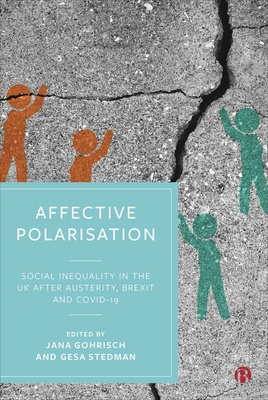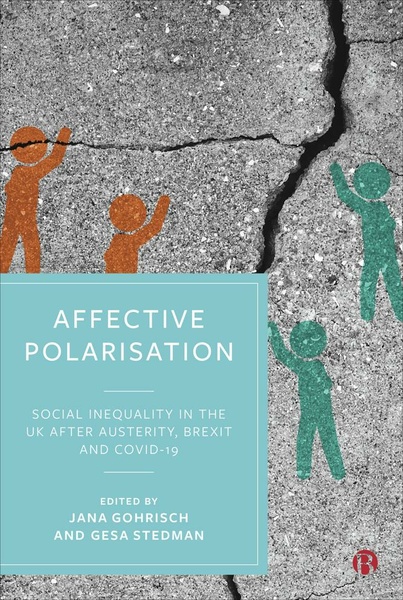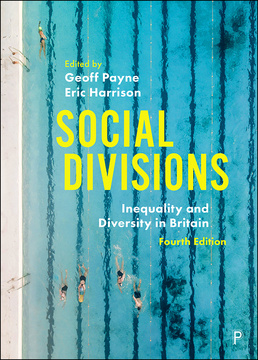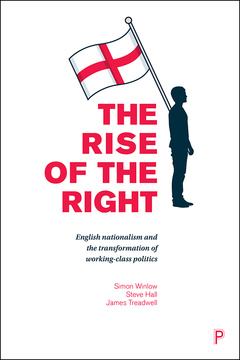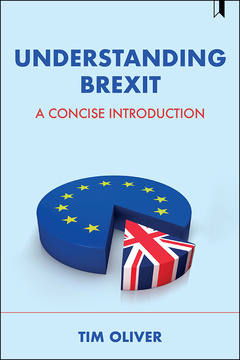Affective Polarisation
Social Inequality in the UK after Austerity, Brexit and COVID-19
Edited by Jana Gohrisch and Gesa Stedman
Published
Sep 25, 2023Page count
192 pagesISBN
978-1529222265Dimensions
234 x 156 mmImprint
Bristol University PressPublished
Sep 25, 2023Page count
192 pagesISBN
978-1529222272Dimensions
234 x 156 mmImprint
Bristol University PressPublished
Sep 25, 2023Page count
192 pagesISBN
978-1529222272Dimensions
234 x 156 mmImprint
Bristol University PressInequality is an ever-present danger in our society. This important book addresses the crucial nexus between the lived experience of inequality and how it shapes political responses.
With contributors from the UK and Continental Europe, the book compiles case studies with theoretically informed discussions of the relationship between affective polarisation, social inequality and the fall-out from Brexit and COVID-19. Using a broad concept of social inequality, the book incorporates aspects of economy and society, language, and emotion culture, as well as interviews and film in historical and transnational perspectives.
The contributors offer a powerful examination of the ways in which the politics of the UK and the lived experiences of its residents have been reframed in the first decades of the 21st century.
“This edited book is essential for anyone interested in social, ethnic and gender inequalities in contemporary Britain. It approaches the topic from different disciplines, painting a critical and nuanced picture.” Isabelle Hertner, King’s College London
Jana Gohrisch is Professor of British and Postcolonial Studies at Leibniz University Hannover.
Gesa Stedman is Professor of British Culture and Literature at the Centre for British Studies, Humboldt-Universität zu Berlin.
Introduction – Gesa Stedman and Jana Gohrisch
1. The Divided Left in the UK: Partisanship, Ideology, and Class After Brexit – Paolo Chiocchetti
2. Populism and the People: Elitism, Authoritarianism and Libertarianism – Kirsten Forkert and Marius Guderjan
3. “Coloring the Utterance With Some Kind of Perceivable Affect.” Constructing ‘Country’ and ‘People’ in Speeches by Theresa May and Boris Johnson: A Linguistic Perspective – Rainer Schulze
4. The Challenges of Polarisation: Lessons for (Re)politicising Inequality Across Four English Towns – Insa Koch, Mark Fransham, Sarah Cant, Jill Ebrey, Luna Glucksberg, Mike Savage
5. ‘Go Away, but Don’t Leave Us.’ Affective Polarisation and the Precarisation of Romanian Essential Workers in the UK – Anisia Petcu
6. Racialised Affective Polarisation in the UK – Jana Gohrisch
7. “Now You Have To Listen”: A Historical Analysis of Britain’s Left-Behind Communities – Harvey Butterfield
8. Britain in a State of Emergency – Studying Ken Loach’s Films I, Daniel Blake (2016) and Sorry We Missed You (2019) – Ellen Grünkemeier
9. Cloaking Class – Making the Working Class Visible – Lisa McKenzie
10. Class, Poverty and Inequality in Scotland: Independence and the Creation of Affective Polarisations – Carlo Morelli and Gerry Mooney
11. Language and Identity – the Taliesin Tradition – Ifor Ap Glyn
Conclusion – Gesa Stedman and Jana Gohrisch







